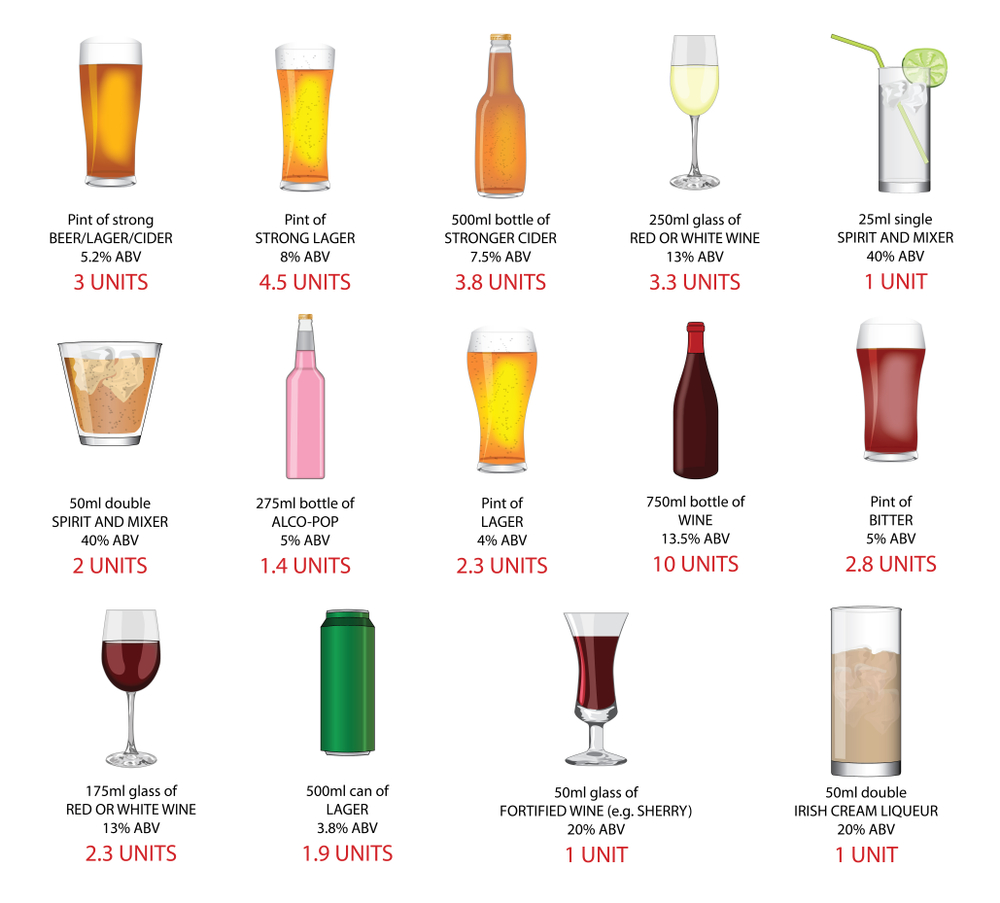With New Year mow upon us, many of us start to think of positive health choices to change how we feel and look.
One area that is a popular and easy area to address is alcohol consumption.
Especially after the party seasons over indulgences we may have taken part in.
Alcohol Consumption Recommendations UK
The UK Chief Medical Officers’ (CMO) low risk drinking guidelines recommend that to keep the risk from alcohol low both men and women should not regularly drink more than 14 units a week. If you do choose to drink, it is best to spread your drinks evenly throughout the week.
If you regularly drink more than 14 units of alcohol a week, try these simple tips to help you cut down.
Just so you know what 14 units looks like:
Fourteen units is equivalent to 6 pints of average-strength beer or 10 small glasses of low-strength wine measured at 125ml per glass.

Binge Drinking
The NHS defines binge drinking as “drinking lots of alcohol in a short space of time or drinking to get drunk”.
Because everybody is different, it is not easy to say exactly how many units in one session count as binge drinking.
The speed of drinking in a session can also alter alcohol’s effects.
In the UK, binge drinking is drinking more than:
- 8 units of alcohol in a single session for men
- 6 units of alcohol in a single session for women
Examples:
- 6 units is 2 pints of 5% strength beer or 2 large (250ml) glasses of 12% wine
- 8 units is 5 bottles (330ml) of 5% strength beer or 5 small (125ml) glasses of 13% wine
Why is binge drinking dangerous?
Your body can only process one unit of alcohol per hour
Two large glasses of wine may not seem like very much. But drinking six units of alcohol in a short space of time – an hour, say – will raise your blood alcohol concentration (BAC) and could make you drunk very quickly.
Drinking too much, too quickly on a single occasion can increase your risk of:
- accidents resulting in injury, causing death in some cases
- misjudging risky situations
Ideally having a total break from alcohol for a few weeks does everyone a world of good. Although in some cases cutting back is also a positive step to feeling “healthier”. So, when clients ask for tips on how to control alcohol intake, I provide a few simple tips
Make a plan
Before you start drinking, set a limit on how much you’re going to drink.
Plan Ahead
If you know you will be out on a number of occasions in one week. Especially for those that entertain for work decide what occasions you will and not drink and keep to it.
Never drink on an empty stomach
Here’s a bit of science – alcohol is absorbed into the body via the small intestine, not the stomach. So, if you’ve eaten, it will take longer for the alcohol to reach your intestine.
Set a budget
Only take a fixed amount of money to spend on alcohol.
Let them know
If you let your friends and family know you’re cutting down and it’s important to you, you could get support from them.
Or don’t let them Know
If you find you have any unsupportive friends a simple tip is disguise your drink. A glass of white wine can easily be watered down with soda water. Then just top it up with soda water throughout the event.
Take it a day at a time
Cut back a little each day. That way, every day you do is a success.
Make it a smaller one
You can still enjoy a drink but go for smaller sizes. Try bottled beer instead of pints, or a small glass of wine instead of a large one.
Have a lower-strength drink
Cut down the alcohol by swapping strong beers or wines for ones with a lower strength (ABV in %). You’ll find this information on the bottle or ask behind the bar.
Stay hydrated
Have a glass of water before you have alcohol and alternate alcoholic drinks with water or other non-alcoholic drinks.
Take a break
Have several drink-free days each week.
Benefits of cutting down
The immediate effects of cutting down include:
- feeling better in the mornings
- being less tired during the day
- better looking skin
- feeling more energetic
- better weight management
Long-term benefits include:
Mood
There’s a strong link between heavy drinking and depression, and hangovers often make you feel anxious and low. If you already feel anxious or sad, drinking can make this worse, so cutting down may put you in a better mood generally.
Sleep
Drinking can affect your sleep. Although it can help some people fall asleep quickly, it can disrupt your sleep patterns and stop you sleeping deeply. Alcohol is full of sugar so it provides a peak followed by a dip which can cause you to wake up. Not only that Alcohol is a diuretic, it acts on the kidneys to make you pee out much more than you take in – which is why you need to go to the toilet so often when you drink. In fact, for every 1g of alcohol drunk, urine excretion increases by 10ml. Which is why you wake up so often to go to the loo. Alcohol also reduces the production of a hormone called vasopressin, which tells your kidneys to reabsorb water rather than flush it out through the bladder. With the body’s natural signal switched off, the bladder is free to fill up with fluid. So, cutting down on alcohol should help you feel more rested when you wake up.
Behaviour
Drinking can affect your judgement and behaviour. You may behave irrationally or aggressively when you’re drunk. Memory loss can be a problem during drinking and in the long term for regular heavy drinkers.
Heart
Long-term heavy drinking can lead to your heart becoming enlarged. This is a serious condition that can’t be completely reversed but stopping drinking can stop it getting worse.
Immune system
Regular drinking can affect your body’s ability to fight infections. Heavy drinkers tend to catch more infectious diseases.
